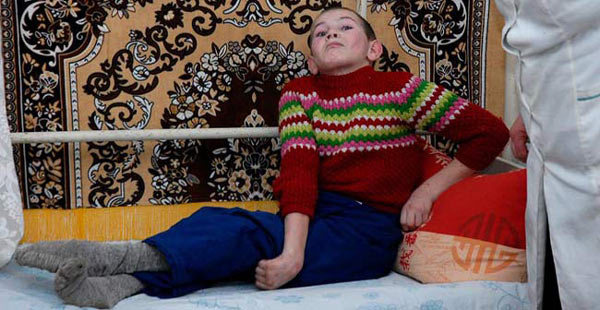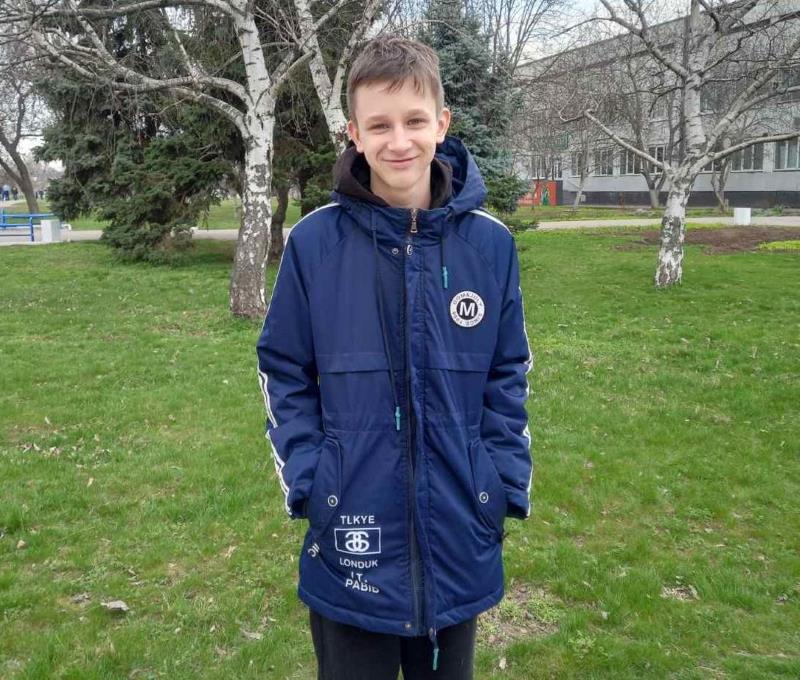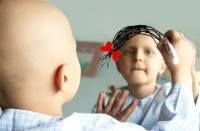Alyosha is no more available for adoption.
Amongst thirteen other boys, Alyosha does not immediately stand out. He never screams or pushes his way toward guests, instead preferring to sit in his wheelchair off to the side. Only when you begin to pay him attention does he raise his arm in welcome, as if saying: “Here I am! Hello!”
Alyosha is 18. They say that he used to be able to walk. He lived with his parents, before they returned him to the children’s home. Alyoshka himself rarely speaks – he can, but every word is pronounced with great difficulty.
Alyosha first received a wheelchair two years ago. He began going on walks with the other boys – those in wheelchairs and those who could walk. The noisy crowd of boys never allows for a quiet excursion. The wheelchair boys yell at the nannies and ask the same question dozens of times (just to attract attention), while the boys who can walk can never be let out of sight – one jumps a fence, another decides to play tag. Seven children is far too many for one nanny to take on a walk, while in the pavilion twenty children scream to be taken along. Amidst the chaos only Alyoshka remains calm: he sits and waits, never begging for attention unless necessary. He carves a circle in the air with his arm, in order to grab blades of grass and forcefully yank them from the earth. He raises them to his face, sinking into the smell and the blissfully new sensations. His face, amidst the noise and din, raging all about, expresses peace and blissfulness.

During our first visit to Kalinovka in spring 2007 Alyosha was kept permanently in a bed with the most challenging children

As we discovered in the future, Alyosha understands everything, can count, remembers many letters – all this despite spending years without any intellectual activity, surrounded by severely mentally handicapped children
From the recollections of a volunteer, who worked in the children’s home last summer:
“Paying attention to only one child is impossible. Dozens of pairs of eyes carefully watch your every move. Some whine and begin to act up, others may walk up and hit you, just to get your attention. Once I decided to take Alyoshka on a walk. Just Alyosha, if only to give him an hour of solitude to ease his pain. I don’t even remember how I did it, but I managed to slip away. I take him on his wheelchair to a quiet spot near a small outbuilding, where under the shade of ancient trees one may sit next to a stone well, long run dry. I have his books with me, which I found in the activity room. He picks blossoms from a bush, exposes his face to the dry steppe wind, listens to the story and asks me to continue, struggling to pronounce “More.” I think that he will remember this half-hour walk the rest of his life.”

Yet another experience:
“In the spring therapists, psychologists, and doctors came to hold a seminar at the children’s home. Among the delegation’s members was a specialist in therapeutic equipment. Taking advantage of such an opportunity, I asked for his advice on how to make measurements for individualized wheelchairs for the children with special needs. Together we brought Alyosha into another room in order to make the measurements. As we carried him over, we laughed and joked on various subjects entirely unrelated to life in the children’s home. Only when we pushed the wheelchair into the room did I notice that Alyoshka was sitting with his head turned intentionally away. There were tears in his eyes. He definitely did not want to twist around or talk with us. All of my efforts to engage him were unsuccessful, even though we’d been friends until then. He had joyfully met us a few minutes before and it had been easy then to engage him, although not in the usual sense of the word.
We sit for a while; I say something to him and he refuses to turn around. He knows that we’ll soon stand up and leave, returning to our healthy, adult world, where we may joke and laugh, solve problems, travel for business purposes, and perform any number of useful and useless tasks. Only he will remain here, in the pavilion, waiting. I feel guilty. I don’t know how to comfort him. What could I say… “This summer we’ll go with you to the sea. Just don’t cry. Please…” I leave. Goodness gracious, I don’t even know how I’ll possibly make good on my promise, which was so easy to give in the moment.
Summer of 2009. Twelve children are headed for summer camp. Children in wheelchairs had never before been at the summer camp. The camp does not differ in the least from other sanatoriums and retreats – have you ever seen wheelchair ramps alongside steep staircases leading down to the sea? Special ramps, wide doors, specially fitted toilet seats? I’ve seen them: in Switzerland, Holland, Germany – but not in Ukraine. Dima Say (volunteer from Nikolaev), recently back from the United States, has also seen them…Every time that he hoists Alyosha on his back, in order to carry him to the small pavilion by the sea, those wheelchair ramps likely appear much more clearly in his mind. Without Dima Alyoshka would never have gone to the sea—the nannies are not capable of carrying a grown-up boy on their backs.

Without Dima Alyoshka would never have gone to the sea—the nannies are not capable of carrying a grown-up boy on their backs
It was here that he found his first friend…
Vitya was a pleasant boy with a bright smile from another psychological-neurological children’s home. I’ve no idea how, in the midst of the crowd of children from various children’s homes, they were able to find one another. However, since that time, whenever the children gathered together, Alyosha and Vitya were inseparable. Vitya began pushing Alyoshka’s wheelchair in a circle, which gave them both so much joy! Alyoshka’s legs skimmed along the asphalt, seeing as how he’s without footrests. “Vitya, please, do not push him anymore. Look, his bare legs are catching and scratching against the ground,” I would say. It seemed, though, that Alyoshka did not feel any pain. His face was always lit by a blissful smile.

Vitya and Alyosha
One of the sanatorium workers walked up and offered to make footrests for his wheelchair. “Well, look at that, what kind people,” I thought to myself. Four of the workers were already discussing how to make adjustments for his feet, and promised to have them ready in a short while.
“Alyosha,” I was beside myself with joy, “they’re making you footrests.” This meant that he wouldn’t have to hold his legs suspended in the air any longer, which is quite tiring. Alyoshka smiled. A day passed, two, an entire week…In place of the promised footrests Dima and I began planning to tie on a pillowcase on which he might rest his legs. In a few days, though the pillowcase snapped. Next, a strap from a large bag solved the problem.
The footrests were never made.
Adults with good intentions. I don’t think I’ll ever become used to unfulfilled promises. Or to offers of help, when, for example, a much-needed item is given (for a child or children’s home), but it turns out the item is slightly damaged and needs to be fixed, or must be picked up from another city or the remainder of the price covered by the organization.
The three of us live in the same room: me, Dima, and Alyosha. Because of the narrow balcony door we must lift him from his wheelchair and carry him into the room ourselves. It is also difficult to manage the toilet and washroom. Alyoshka is grown-up and he’s hesitant to accept help even from Dima.
“Alyoshka, do you have dreams?”
“YYYY-yep!”
“What do you dream about?”
“The sssss-sea.”

Summer 2009 – for the first time in his life Alyosha swam in the sea
More than anything else in the world Alyoshka likes to string beads. He has difficulty holding a spoon because his motions are jerky and awkward. His head is always slightly cocked back. When he is brought to class, however, and the teacher places a dish with tiny beads before him and puts a string in his hand a miracle takes place. No, no one ever believes what happens next. You must see it for yourself—how he places beads onto the string. One after another. What an unbelievable expression appears on Alyosha’s face at times like these. One can only call it inspiration. His soul is poured into this flower, each petal of which he threaded and tied himself! What pride in his eyes! “I did it myself! I was able to! Look at me – I can do this!”


“I did it myself! I was able to! Look at me – I can do this!”
Alyoshka cannot speak, so I must speak for him:
“I don’t see the world, unless someone takes the handles of my wheelchair. I don’t fashion the petals of a flower, unless someone places the beads upon my knees. I don’t meet with a friend, unless someone else organizes our meeting.”
But how badly he wishes to…
In order for Alyoshka and other children to be more comfortable in this world, they need you and your help. The smallest things are important: money to help pay for a teacher and crafts instructor, packages with beads and string, books and building blocks, financial aid to help purchase medicine and individualized equipment for rehabilitation.
Recently, because of the financial crisis, sponsors’ support of the children’s home has diminished. We have reserves to pay for the teachers and aides’ salaries for several months yet. But these reserves are dwindling. We also understand that those who have faithfully contributed funds each month for the past two years also do not have limitless funds and might at some point choose to stop contributing their portion.
Thanks to the children’s home’s administration and staff, as well as to our sponsors and our teachers the situation in the home is changing for the better, but is not yet stable. Having offered these children the opportunity to learn and develop talents, hidden in them since birth, we cannot strip them of this opportunity in the coming years.
Alyoshka, it is difficult to deliver on what has been promised. What awaits you tomorrow? Next summer? In five years? A wheelchair, classes, adventures? Or, as in past years: a bed and bare wall?
Since Alyosha is already grown up he cannot be adopted but he can be taken into foster care.
Anya Gerashchenko, Kharkov
ann.g.ko@gmail.com
Additional info on the children’s home in Kalinovka (Zaporozhskaya oblast’)
How to financially support Alyosha and the other 120 children in Kalinovka



